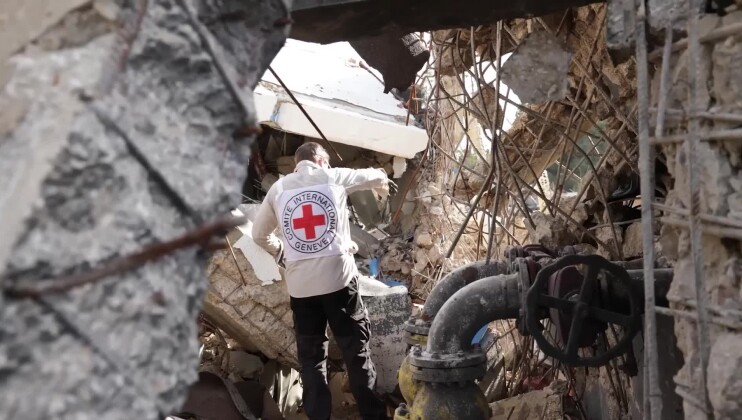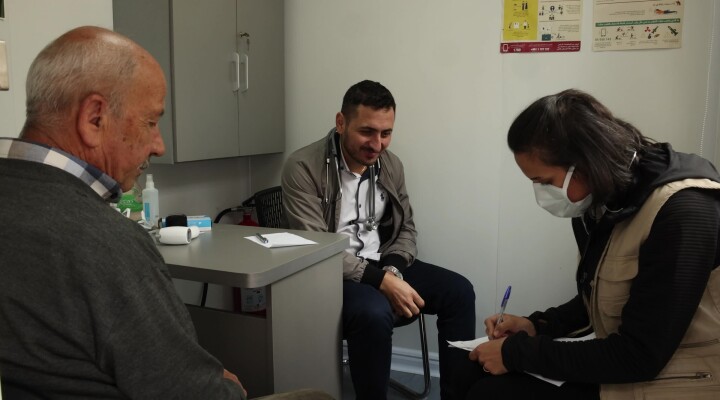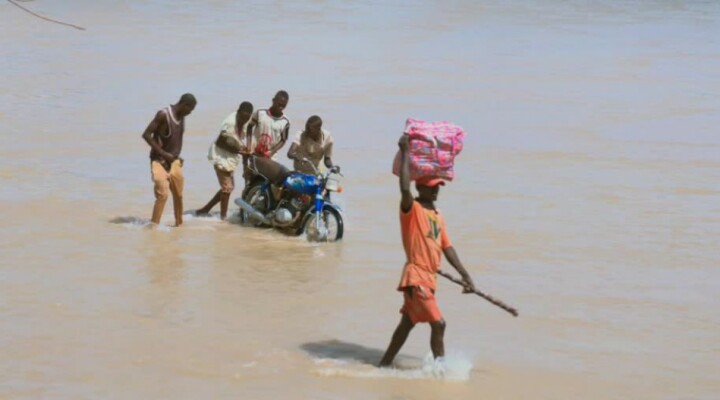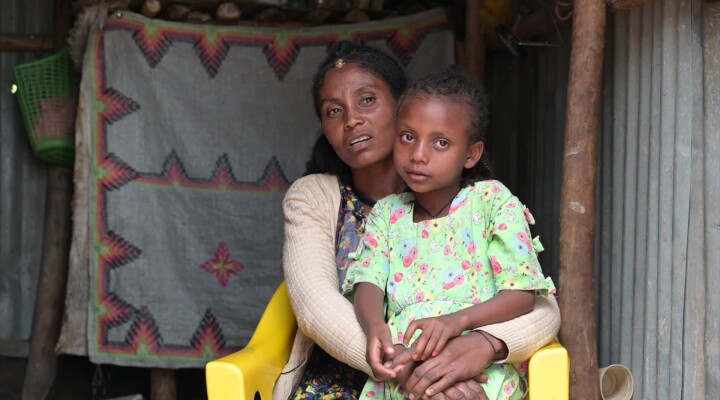Ukraine: Wounded and sick patients transported to advanced medical care
Between 29th June and 1st July 2022, teams from the International Committee of the Red Cross (ICRC) supported 10 patients with medical needs and their caretakers from Odesa and Dnipro. The patients, originally from the city of Mykolaiv as well as the Donetsk region, had been unable to seek medical care on their own.
ICRC ambulance drivers and medical personnel, in cooperation with the Ukrainian Red Cross Society, transferred the patients for treatment from the Donetsk region to a safer area in Dnipro, and from Odessa across the border to Moldova. Civilians evacuated to Chisinau received medical care before eventually being transported to one of 16 European countries of their choice for permanent resettlement.
“I was being evacuated with my daughter and granddaughters when we heard explosions,” said Tatyana, who was transported from Kramatorsk to Moldova “The scene was horrible; some people were laying without arms or legs. I had a blast wound in my leg and couldn’t stand up without falling. My granddaughters started shouting. Their mom was not moving. The ambulance crew couldn’t save her; she died instantly. I didn’t even get to say goodbye to her. I was taken to the hospital, had surgery, but my ankle joint doesn’t work. I want to reach Germany and have another surgery. I hope I will walk again.”
Despite fighting and insecurity, the Red Cross teams continue to transport patients to hospitals for medical care. “We have to be very quick. Sometimes we have less than one hour to evacuate the patient,” says Klaus Siedler, a German Red Cross EMT/nurse currently working with the ICRC on this operation. This project began in March and has helped 171 people and their caretakers to date.
Note to editors:
- All footage is copyright ICRC
- The ICRC has been working in Ukraine since 2014, supporting people affected by conflict. Since the recent escalation of the crisis, we have brought over 1’200 tons of medical supplies, food and relief items into the country to respond to skyrocketing humanitarian needs. We will continue to scale up our work and now have teams in 10 locations across the country.
- The operation from Odesa is done jointly between the ICRC sub-delegation in Odesa and the newly ICRC delegation in Moldova.
- Established in 1863, the ICRC operates worldwide helping people affected by conflict and armed violence and promoting the laws that protect victims of war. A neutral, independent and impartial organization, its mandate stems from the Geneva Conventions of 1949. It is based in Geneva, Switzerland, and works in more than 100 countries.
Location: Odesa and Dnipro
Date: 29th June – 1st July 2022
Camera: ICRC
Duration: 09:55
ICRC Ref:
LOGLIST FOR FOOTAGE AND PHOTO CAPTIONS
Medical evacuation Dnipro
00:00 Ambulances driving
00:04 Loading the first patient into the ambulance in Dnipro
00:11 Interview Benedikt Bosse, paramedic team leader
00:23 Second patient is helped into the ambulance
00:29 Ambulance driving
00:32 Arrival at the hospital
00:44 Interview Tatyana – evacuated patient from Kramatorsk
Medical evacuation Odesa
04:05 Shot of an ICRC ambulance
04:14 Preparing the ambulance to pick up a patient
04:21 Driving to Odesa
04:41 Checking equipment
04:49 Preparing a patient for transport
05:15 Interview with Vasilii Anatoliiovych – evacuated patient from Mykolaiv
05:41 Transporting a patient from his hotel room to the ambulance.
06:48 Helping a second patient and his wife into the vehicle
07:03 Driving to Chisinau
07:17 Interview with Nicola – Ambulance driver from the German Red Cross
09:08 Arrival in Chisinau
09:18 Helping the patients out of the vehicles
Timecoded transcripts
- Benedikt
00:11 I’m Benedikt, paramedic team leader here at Ukraine.
00:14 We are operating in the Donestk region
00:17 And we are doing medical evacuations for people
00:20 who are injured by fighting or under critical condition.
00:25 We support the local healthcare system
00:28 with transferring patients to hospitals with more capacities
00:33 or specialized medical facilities.
00:36 Yesterday we transferred seven people and for today we have a patient who needs specialized treatment in a bigger hospital.
- Tatyana
00:44 I came to Moldova after what happened in Kramatorsk, Donetsk region, thanks to the help of the Red Cross
00:54 We were evacuating, we came to the railway station and were waiting for the train.
01:03 There were a lot of people, we joined a queue and waited on the side [of the station] facing the railway track. I was going to travel together with my elder daughter and my two grandchildren.
01:20 Then I stepped aside, and we heard explosions.
01:28 We saw black smoke and immediately heard two explosions overhead. They were like fireworks.
01:39 Most people started dropping onto the ground, my daughter and granddaughters also lay down onto the ground.
01:45 When the explosions were over, I saw my granddaughters raise their heads. And they startd shouting to me, “Granny, Mommy is not raising her head.”
01:59 I wanted to come up, but it turned out that I had a blast wound on my leg. I rose and immediately fell down.
02:07 My tendons were ruptured and everything. Volunteers rushed up to me and applied a tourniquet. I wanted to come up to my daughter, but I couldn’t walk. Police were the first to arrive and they took me to hospital. But it was such a horrible scene there. Some were lying without legs, some without arms.
02:36 My granddaughters told me later that when the ambulance arrived their Mommy, my daughter, was found to have been wounded in the back, in an artery in the neck, in the side. To put it shortly, the ambulance crew said that her artery had been hit and she died instantly, she could not have been saved. And I was taken to hospital, I didn’t even say goodbye to her.
03:01 And that was how I lost my daughter. After what happened at the station, I was taken to hospital. I had a surgery and had that shrapnel fragment removed in Kramatorsk. And then I was going through rehabilitation until my wounds healed. And then, thanks to my other daughter who contacted [the ICRC], they helped me to evacuate from there. My ankle joint doesn’t work, but hopefully I can walk again.
03:34 I still hope that if I go to Germany and have a surgery, I can walk on my own again.
03:42 What can I say, all of it is horrible, I can’t get my daughter back. But I have to keep on living because I have four grandchildren, two of them have remained without Mommy or Daddy. I have to keep on living for them. And thanks to everyone who helps, thank you.
- Vasilii Anatoliiovych
05:15 I am from Mykolaiv, Ukraine. Vasilii Anatoliiovych [surname inaudible].
05:22 I don’t remember. I reached it somehow.
05:25 Well, we are optimistic. We want to go to Moldova and then we would like to go to Germany. My sister has moved there together with my mother from the Kherson region. We want to be together with our family.
- Nicola
07:17 My name is Nicola. I'm from Germany, and I'm currently working now with the ICRC, doing the transport of the patient from Odesa to Chisinau.
07:29 We do transport of people from Odessa to Chisinau now to bring them into a hotel, so they will be transferred to other European or whatever countries. And the other part of the program is collecting the patients from wherever in Ukraine to Odessa that we can take them and transport them to Chisinau. So we are the last part of the journey.
08:11 Every human being has the right to go. So we support everybody, no matter which nationality whatsoever, for sure. And every patient needs a company person, because you cannot leave the people alone. So if I got your question correct.
08:34 This is a completely new project, cooperation between German Red Cross as a national society with the ICRC. So we are German Red Cross members who come here, something for the first.



